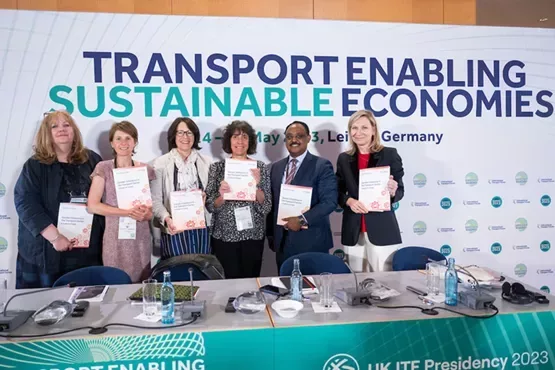Women face persistent barriers when entering and working in the transport sector at all levels, according to new research and toolkit from World Bank’s Sustainable Urban Mobility for All (SUM4All) initiative and POLIS, funded by the FIA Foundation.
The report ‘Gender imbalance in the transport sector: A toolkit for change’ was launched at the International Transport Forum Summit in Leipzig. The report is the result of pioneering research which examined existing data and conducted in-depth interviews and surveys to build a comprehensive global analysis of employment practices and women’s lived experiences working in the sector. Just 16.8% of those working in transport worldwide are women, representing only 5.5% of the workforce in Arab States and 10% in Africa compared to 29% in North America.
Women working across the transport sector continue to face multiple challenges to entering, remaining, and advancing their careers. This study identified five key barriers which are critical to addressing the current gender imbalance:
- Gendered stereotyping remains strong with persistent occupational segregation, with women still underrepresented in many positions- particularly STEM-based roles and driving positions.
- Discriminatory workplace cultures persist including the risk of harassment and even violence;
- Lack of flexible working and childcare provisions limiting women’s ability to remain in the workplace;
- The glass ceiling remains, limiting opportunities for career progression and leadership roles;
- The approach to gender must be intersectional, recognising the interconnected issues of diversity including racial, sexual and socio-economic equality.
These findings demonstrate that policy frameworks lay the foundations for change, but cannot be solely relied on to achieve transformative change on the ground. Action at the leadership level, with comprehensive equitable employment systems and processes developed within organisations must build on policy, to translate it into tangible change.
The report highlights the importance of gender equity at a leadership level, as disparity here continues, placing transport as one of the worst-performing sectors in regard to gender balance. It is noteworthy, therefore, that the report also found that at the political level the disparity continues; just 7 of 64 International Transport Forum member countries and 15.5% of EU Member States have female ministers with transport portfolios. The report includes interviews with women occupying leadership positions and their lived experiences of breaking through the ‘glass ceiling.’
However, the research identifies a clear capacity, and urgency, for progress. To support this, the accompanying toolkit contains an extensive set of case studies and provides in-depth and practical recommendations for practitioners. With 25 case studies from transport organisations from across the world, including UPS, Kochi Metro, Go-Ahead Group, the International Longshore and Warehouse Union, (ILWU) Canada and Alta, it is a broad-ranging resource for practitioners across the sector, from aviation to maritime to public transport.
“Failing to capitalise on the extraordinary talents and abilities of the many women at work at all levels in the transport sector is not only a terrible waste of talent and resources but also potentially undermines wider work on sustainability, in which women have a key role to play,” said Sheila Watson, Deputy Director, FIA Foundation.
“The lack of gender diversity, in particular, is apparent. While we have seen a growing recognition of the necessity for change, displayed vividly in this study, translating words into action has been far slower. Sustainable and inclusive transport services cannot be delivered without a more diverse workforce. We need to be able to reflect and represent who we seek to serve, and at present, the transport workforce is far from achieving this much-needed diversity,” said Karen Vancluysen, Secretary General, POLIS.
Heather Allen, gender and sustainable transport expert and report author, added: “The transport sector is undergoing transformational change in many areas. As labour markets tighten, we need to ensure that its workforce can respond to these challenges. Our study shows that currently despite many policies being in place it remains predominantly masculine. This is partly due to a historical legacy of inflexible working practices and widespread stereotyping, so the sector needs to change from the inside out. Increasing the diversity of workforce will help the sector’s capacity to confront its significant skill shortages, as well as contribute towards its ambitions of sustainability, innovation and inclusivity.”
























